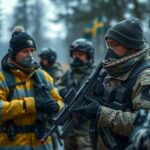Sweden and Finland Urge Citizens to Prepare for Potential Conflict
In response to heightened security concerns amid the conflict in Ukraine, Sweden and Finland are advising their citizens on preparations for potential war. Sweden has distributed millions of pamphlets detailing readiness strategies, while Finland launched a website on crisis preparedness. This marks a shift from their historical military non-alignment to an enhanced focus on national defense and resilience against emerging threats.
In an unprecedented move reflecting heightened security concerns, both Sweden and Finland have taken significant steps to prepare their citizens for potential conflict. Sweden has circulated millions of pamphlets with guidance on readiness for war and other crises, while Finland has established a dedicated website focused on emergency preparedness. This shift comes in the context of the ongoing war between Russia and Ukraine, prompting these Nordic nations to abandon decades of military non-alignment and actively bolster their defenses, including the recent embrace of NATO membership.
Mikael Frisell, director of the Swedish Civil Contingencies Agency, emphasized the seriousness of the security environment, stating, “The security situation is serious and we all need to strengthen our resilience to face various crises and ultimately war.” In light of past security threats, Sweden has restructured its defense strategy, which includes the reintroduction of conscription and substantial increases in defense spending. The initiative to disseminate the booklet titled If Crisis or War Comes marks the first widespread distribution since the Cold War, focusing on practical advice such as food and water storage, financial readiness, and home gardening.
Finland, which shares a significant border with Russia, has similarly increased its preparedness efforts. Following the invasion of Ukraine, the Finnish government is constructing a 200-kilometer border fence with Russia, expected to be completed by 2026. The emergence of a heightened military threat has led both nations to foster a mindset of readiness among their populations in view of possible military encounters.
As the situation evolves, Sweden and Finland’s proactive measures aim not only to inform citizens about potential threats but to foster a culture of preparedness and resilience. This notable pivot underscores the urgency of adapting to new geopolitical realities and the pressing need to ensure national security against emerging global threats.
The recent developments in Sweden and Finland are rooted in a changing security landscape following Russia’s military actions in Ukraine. Historically neutral, both countries have altered their defense postures, moving towards NATO integration and increasing military readiness in response to perceived threats. This shift reflects a broader trend among European nations recalibrating their defense strategies in the wake of aggressive foreign policies and rising tensions. The long-standing practice of military non-alignment has been challenged, prompting a collective reassessment of national and regional security priorities. Sweden’s historical military neutrality, lasting for over two centuries, is now questioned as citizens face the potential reality of armed conflict. The dedicated efforts to inform and prepare the public embody a significant transformation in approach towards national defense. Finland’s actions, including the construction of the border fence with Russia, further illustrate the regional urgency for enhanced security measures.
Sweden and Finland’s recent initiatives signal a profound shift in their approaches to national security in light of escalating global tensions. By providing citizens with resources and practical advice on emergency preparedness, both nations are taking proactive steps to foster resilience. The abandonment of long-standing military neutrality in favor of collaboration with NATO indicates a clear recognition of the need for heightened defense strategies. As the geopolitical landscape continues to evolve, the importance of being prepared for potential crises remains paramount for these Nordic neighbors.
Original Source: www.thenationalnews.com








Post Comment